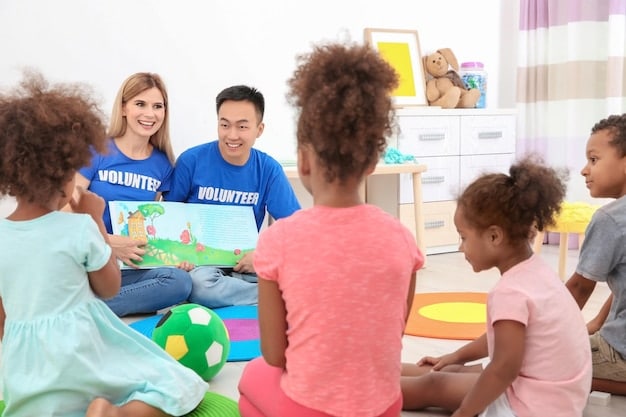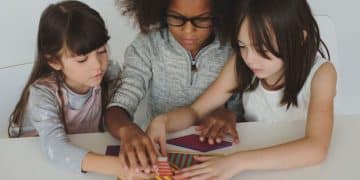Early Childhood Education Benefits: A Comprehensive Parent Guide

Anúncios
Early childhood education lays a crucial foundation for a child’s holistic development, fostering cognitive, social, and emotional skills essential for lifelong success and adaptability in a complex world.
Anúncios
Embarking on the journey of parenthood often brings with it a myriad of questions, especially concerning a child’s early development and future success. One of the most significant investments parents can make is in early childhood education. This comprehensive guide will delve into The Benefits of Early Childhood Education: A Comprehensive Guide for Parents, exploring how these foundational experiences shape a child’s cognitive abilities, social interactions, emotional intelligence, and overall well-being, paving the way for a brighter future.
The Crucial Role of Brain Development in Early Years
The brain undergoes its most rapid and critical development during early childhood. From birth to age five, billions of neural connections are formed, laying the groundwork for all future learning, behavior, and health. Understanding this profound developmental phase is key to appreciating the impact of early education.
Early experiences and relationships directly influence brain architecture. Positive, stimulating interactions strengthen neural pathways, enhancing cognitive functions and emotional regulation. Conversely, a lack of engagement or exposure to stress can hinder this vital development. Early childhood education environments are designed to provide these optimal conditions, offering consistent positive interactions and a rich tapestry of learning opportunities that foster robust brain development. Children are exposed to new concepts and challenges in a supportive setting, which builds their confidence and readiness for future academic pursuits.
Anúncios
The most crucial period for brain development occurs from birth to age five, during which billions of neural connections are rapidly formed, laying essential groundwork for future learning and behavior.
Foundational Cognitive Skills Acquired
Early childhood education is a powerful catalyst for developing essential cognitive skills. Children learn to think critically, solve problems, and understand abstract concepts. These are not merely academic skills but foundational tools for navigating the complexities of everyday life. The structured yet flexible environments found in early learning centers provide numerous opportunities for children to engage with materials and activities that stimulate intellectual growth. They are encouraged to ask questions, explore, and experiment, fostering a natural curiosity that drives lifelong learning.
Within these settings, children develop:
- Problem-solving abilities: Engaging in puzzles, constructive play, and logical reasoning activities trains young minds to identify challenges and devise solutions.
- Language and literacy skills: Exposure to diverse vocabulary, storytelling, and early reading activities builds a strong linguistic foundation.
- Numeracy concepts: Hands-on activities involving counting, sorting, and patterns introduce basic mathematical understanding in an engaging way.
These early exposures are instrumental in setting the stage for formal schooling, ensuring children enter kindergarten with a strong cognitive toolkit. The interactive nature of these programs means that learning is not a passive activity but an immersive experience where children actively construct their understanding of the world.
Fostering Social and Emotional Intelligence
Beyond academics, early childhood education plays an indispensable role in cultivating a child’s social and emotional intelligence. These are the soft skills that underpin successful relationships, effective communication, and resilience in the face of life’s challenges. In a group setting, children learn to navigate complex social dynamics, empathize with others, and manage their emotions constructively. This learning happens organically through daily interactions and guided play.
The classroom becomes a micro-society where children learn to share, cooperate, and resolve conflicts. Educators facilitate these interactions, offering guidance and modeling appropriate behaviors. This constant practice refines their ability to understand and respond to social cues, a skill that is vital for both academic and personal success. Furthermore, being part of a group helps children develop a sense of belonging and community, which fosters self-esteem and reduces feelings of isolation.
Building Empathy and Cooperation
One of the most profound benefits is the development of empathy and cooperation. Children learn to understand and share the feelings of others, an essential component of emotional intelligence. Through group projects and collaborative play, they discover the value of teamwork and compromise.
Key social skills nurtured include:
- Sharing and taking turns: Essential lessons for cooperative play and group activities.
- Conflict resolution: Learning to negotiate and find peaceful solutions to disagreements.
- Understanding diverse perspectives: Interacting with peers from different backgrounds broadens their worldview.
These skills are not just theoretical; they are practiced daily, becoming ingrained habits. The controlled environment allows children to make mistakes and learn from them in a safe space, guided by experienced professionals. This hands-on approach to social learning is far more effective than isolated instruction.
Enhancing Language and Communication Skills
The early years are a critical period for language acquisition, and high-quality early childhood education programs significantly enhance a child’s verbal and non-verbal communication abilities. Surrounded by peers and educators engaged in purposeful conversations, storytelling, and interactive play, children are immersed in a language-rich environment that goes beyond what they might experience at home. This constant exposure to diverse vocabulary, sentence structures, and communication styles accelerates their linguistic development.
Educators actively encourage dialogue, ask open-ended questions, and provide opportunities for children to express themselves both verbally and creatively. This active engagement helps children articulate their thoughts, feelings, and ideas more effectively. Moreover, the presence of multiple communication partners means children practice listening skills, understanding different tones, and interpreting non-verbal cues, all of which are vital for effective communication.
Developing Vocabulary and Expressive Language
In preschool settings, children are exposed to a wide array of new words and concepts daily. Story time, discussions, and themed activities naturally broaden their vocabulary. More importantly, they are given ample opportunities to use these new words in context, solidifying their understanding. This active application transforms passive knowledge into usable language.
Methods that significantly boost language skills include:
- Interactive storytelling: Encouraging children to predict outcomes, suggest plot points, and retell stories in their own words.
- Group discussions: Providing forums for children to share their experiences, voice opinions, and engage in respectful debate.
- Dramatic play: Allowing children to act out scenarios, taking on different roles and using varied language to express characters.
These multifaceted approaches ensure that language development is holistic, encompassing both receptive (understanding) and expressive (speaking) skills. Furthermore, confidence in communication built during these years reduces anxiety about speaking in larger groups later in life, contributing significantly to future academic and social success. Children who are confident communicators are better equipped to advocate for themselves and participate actively in their learning journey.
Promoting School Readiness and Academic Success
The ultimate goal of early childhood education often culminates in preparing children for formal schooling. This readiness is not just about knowing letters and numbers; it encompasses a broader range of skills—cognitive, social, emotional, and physical—that equip a child to thrive in a structured academic environment. High-quality programs bridge the gap between home-based learning and the demands of kindergarten and beyond, ensuring a smooth transition and a solid foundation for lifelong learning.
Children who attend early learning programs typically exhibit better kindergarten readiness. They are often more adept at following instructions, working independently, and collaborating with peers. These behavioral skills are as crucial as academic preparedness. Moreover, early exposure to structured learning routines instills discipline and a positive attitude toward education, reducing the potential for anxiety or resistance once formal schooling begins.

Bridging the Gap to Formal Education
Early childhood education provides a critical transition phase, helping children adapt to the routines, expectations, and social dynamics of a school setting. This includes learning to sit still, pay attention, and manage transitions between activities. These are subtle yet vital skills that are often overlooked but are paramount for success in a classroom setting.
Key readiness indicators developed include:
- Following directions: Learning to listen and respond to multi-step instructions.
- Self-regulation: Developing the ability to manage impulses and emotions in a group setting.
- Independent learning: Fostering curiosity and the drive to explore new concepts autonomously.
By developing these skills, children are not just academically ready, but also socially adaptable and emotionally resilient. This holistic preparedness allows them to fully engage with the kindergarten curriculum, rather than spending valuable time adjusting to the new environment. The benefits extend far beyond the initial years of schooling, influencing overall academic trajectories and future career paths.
Cultivating Creativity and Critical Thinking
Early childhood education is a fertile ground for nurturing creativity and critical thinking, two cornerstones of innovation and adaptability in an ever-evolving world. Unlike rote memorization, these programs emphasize processes of discovery, encouraging children to experiment, question, and imagine. This approach recognizes that true learning stems from active engagement and personal exploration, rather than passive reception of information.
Through open-ended play, art activities, and imaginative scenarios, children are given the freedom to express themselves, develop unique ideas, and solve problems in novel ways. Educators act as facilitators, providing materials and prompts that spark curiosity, but allowing children the autonomy to lead their own explorations. This fosters a sense of ownership over their learning, building confidence in their creative abilities. The emphasis here is on the journey of discovery, not just the final product.
Encouraging Exploration and Imagination
The classroom environment is designed to stimulate exploration and imagination. Corners dedicated to art, construction, or dramatic play invite children to delve into different modes of expression and problem-solving. This encourages divergent thinking—the ability to generate multiple solutions to a single problem.
Activities that enhance creativity and critical thinking include:
- Art projects: Using various mediums to express ideas without strict guidelines, promoting artistic expression and out-of-the-box thinking.
- Building blocks and construction: Designing and constructing structures, which develops spatial reasoning and planning skills.
- Role-playing games: Imagining and enacting diverse scenarios, fostering empathy, narrative skills, and creative problem-solving.
These experiences teach children that there isn’t always one “right” answer, encouraging them to think flexibly and embrace ambiguity. This mindset is crucial for navigating real-world challenges where solutions are rarely straightforward. The ability to think critically and creatively is increasingly valued in higher education and the workforce, making these early foundations profoundly impactful.
Long-Term Benefits and Parental Support
The positive impact of early childhood education extends far beyond a child’s initial school years, manifesting as long-term benefits that influence academic, social, and economic outcomes throughout life. Studies consistently demonstrate that children who participate in high-quality early learning programs are more likely to achieve higher levels of education, secure better employment, and lead healthier, more engaged lives. These benefits accrue over time, creating a cumulative advantage that can significantly alter a child’s life trajectory.
For parents, understanding these long-term advantages provides a compelling rationale for investing in early education. It’s not just about preparing a child for kindergarten; it’s about equipping them with the resilience, adaptability, and fundamental skills necessary to thrive in a dynamically changing world. Moreover, parental involvement plays a crucial role in amplifying these benefits, reinforcing learning at home and creating a cohesive educational ecosystem for the child.
Positive Impact on Future Outcomes
Research consistently highlights a strong correlation between early childhood education and improved long-term outcomes. These benefits are seen across various domains, underscoring the holistic nature of these early interventions. This foundation built in early years helps mitigate the effects of adverse childhood experiences and promote overall well-being.
Long-term benefits include:
- Increased academic achievement: Higher graduation rates and better performance in higher education.
- Enhanced social-emotional well-being: Reduced instances of behavioral problems and improved mental health outcomes.
- Economic advantages: Greater likelihood of stable employment and higher earning potential in adulthood.
These outcomes underscore early education as a societal investment, not just a personal one. The return on investment is substantial, benefiting individuals, families, and communities alike. Recognizing this, many policymakers advocate for expanded access to quality early learning opportunities.
The Role of Parental Involvement
While early childhood education programs are transformative, parental involvement remains a critical component of a child’s success. When parents are actively engaged in their child’s learning journey, reinforcing lessons at home, and communicating with educators, the benefits of the program are significantly amplified. This partnership creates a consistent and supportive learning environment that maximizes opportunities for growth.
Ways parents can support their child’s early education:
- Engage in reading together: Daily reading sessions expand vocabulary and foster a love for books.
- Practice learned skills: Reinforce concepts like counting, letter recognition, and problem-solving through everyday activities.
- Communicate with educators: Stay informed about classroom activities and discuss any concerns or progress.
This collaborative approach ensures that the child receives consistent messages about the importance of education and feels supported in their learning endeavors. When parents and educators work in tandem, children are empowered to reach their full potential, benefiting from a rich and integrated educational experience.
Addressing Common Concerns and Misconceptions
Despite the overwhelming evidence supporting early childhood education, parents often harbor questions and misconceptions that can hinder their decision-making process. Addressing these concerns directly and providing accurate information is crucial for informed choices. Common worries range from the perceived financial burden to doubts about whether formal learning is appropriate for very young children. Navigating these concerns requires a clear understanding of the value proposition of early education.
Many parents question if early childhood education stifles a child’s natural curiosity and play, fearing a structured environment might be too rigid. However, high-quality programs integrate play-based learning, recognizing that play is the primary vehicle through which young children explore, experiment, and make sense of their world. These environments balance structured activities with ample opportunities for free play, ensuring a holistic approach to development.

Dispelling Myths About Early Learning
One significant misconception is that early childhood education is solely about academic preparation, pushing children too hard too soon. In reality, modern early learning curricula emphasize holistic development, encompassing social, emotional, physical, and cognitive growth, all delivered through age-appropriate, engaging methods.
Common myths challenged by evidence include:
- “It’s just babysitting”: High-quality programs are far more than childcare; they are structured learning environments guided by qualified educators.
- “Formal schooling is enough”: The foundational skills acquired in early childhood education provide a distinct advantage not easily replicated through later interventions.
- “It’s too expensive”: While costs can be a concern, many programs offer subsidies, and the long-term economic benefits often outweigh initial expenditures.
It is also a common concern that early childhood education might lead to burnout in children. However, well-designed programs prioritize play and exploration, ensuring that learning is joyful and organic. The focus is on fostering a love for learning, not on high-pressure academic achievement. Understanding these nuances helps parents make confident decisions for their children’s future.
Choosing the Right Early Childhood Program
Selecting the ideal early childhood program is a pivotal decision for parents, as the quality and philosophy of the environment significantly impact a child’s developmental journey. With a variety of options available—from traditional preschools and Montessori schools to Reggio Emilia-inspired centers and home-based daycares—the choice can seem daunting. A thoughtful selection process involves evaluating several key factors to ensure the program aligns with both the child’s needs and the family’s values.
Parents should look beyond mere convenience or cost. A high-quality program will prioritize a nurturing and stimulating environment, qualified educators, and a curriculum that supports holistic development. Visiting potential centers, observing classroom interactions, and asking pertinent questions are essential steps in making an informed decision. The goal is to find a place where a child feels safe, engaged, and inspired to learn and grow.
Key Factors to Consider
When evaluating early childhood programs, several critical elements distinguish higher-quality options that contribute most effectively to a child’s growth and well-being. These factors address various aspects from safety to the program’s educational approach.
Essential considerations include:
- Accreditation and licensing: Ensuring the program meets recognized standards for safety, health, and education.
- Educator qualifications and ratios: Checking the experience and training of staff, and the adult-to-child ratio for adequate supervision and attention.
- Curriculum and teaching philosophy: Understanding how the program approaches learning (e.g., play-based, child-led, structured) and whether it aligns with your child’s needs.
- Classroom environment: Observing if the space is stimulating, safe, clean, and organized into inviting learning centers.
- Parent communication and involvement: Assessing how the program communicates with parents and opportunities for parental engagement.
The emotional atmosphere of a classroom is also paramount; children thrive in environments where they feel secure, valued, and respected. Look for signs of warm, responsive interactions between educators and children, and observe how children engage with each other. A program that fosters a sense of belonging and joy in learning will significantly enhance a child’s experience and developmental outcomes.
| Key Aspect | Brief Description |
|---|---|
| 🧠 Cognitive Growth | Fosters critical thinking, problem-solving, and foundational literacy/numeracy. |
| 🤝 Social-Emotional Skills | Develops empathy, cooperation, and effective emotional regulation. |
| 🗣️ Communication Boost | Enhances vocabulary, expressive language, and active listening abilities. |
| 🎓 School Readiness | Prepares children with crucial academic and behavioral skills for formal schooling. |
Frequently Asked Questions About Early Childhood Education
While specific readiness varies by child, many programs begin around ages 2.5 to 3. Research suggests that engaging in high-quality early learning before kindergarten offers significant benefits for cognitive and social development.
No, quality early childhood programs promote creativity and critical thinking through play-based learning, open-ended activities, and opportunities for imaginative exploration, balancing structure with freedom.
Parental involvement is crucial. Actively engaging with your child’s learning, reinforcing lessons at home, and communicating with educators significantly amplify the benefits of early childhood programs, creating a strong support system.
Yes, many early childhood education programs offer scholarships, subsidies, or sliding scale fees based on income. Government programs like Head Start also provide free or low-cost options for eligible families. It’s advisable to research local and federal resources.
Long-term benefits include higher academic achievement, improved social-emotional well-being, reduced behavioral issues, better health outcomes, and increased earning potential in adulthood, demonstrating a significant return on investment.
Conclusion
Investing in early childhood education is one of the most impactful decisions parents can make for their children’s future. The benefits extend far beyond immediate academic gains, encompassing profound growth in cognitive, social, emotional, and communication skills. These foundational experiences create resilient, confident, and well-rounded individuals poised for success in formal schooling and throughout their lives. By understanding the multifaceted advantages and actively seeking high-quality programs, parents can help unlock their child’s full potential, setting them on a path toward lifelong learning and well-being.





